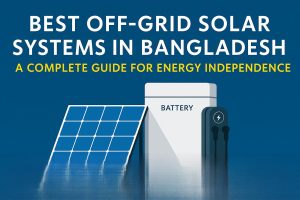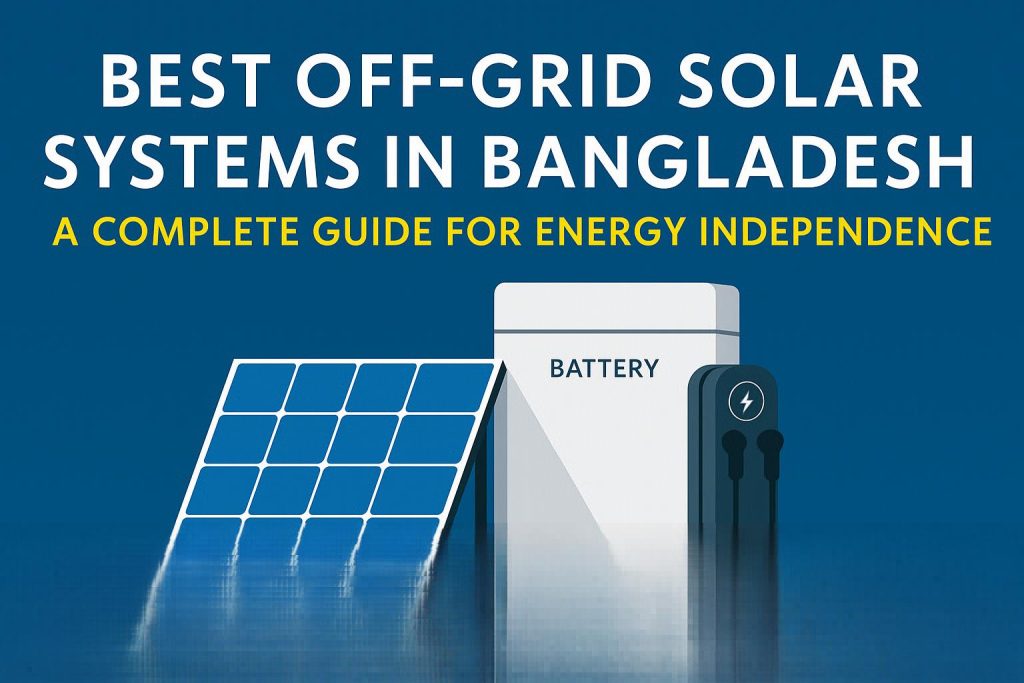Introduction
Bangladesh has experienced rapid growth in solar energy adoption, particularly in off-grid solar systems for rural areas, businesses, and households. With an increasing demand for energy independence, off-grid solar solutions are becoming a viable alternative to unreliable grid connections and expensive fossil fuels.
Bangladesh faces challenges such as frequent power outages, limited access to electricity in remote areas, and high fuel costs, making off-grid solar systems an excellent solution. In this guide, we explore the best off-grid solar systems, key components, cost considerations, and top solar brands in Bangladesh offering high-performance solutions.
1. Understanding Off-Grid Solar Systems in Bangladesh
What Is an Off-Grid Solar System?
An off-grid solar system allows homes, businesses, and rural communities to generate and store electricity without relying on the national grid. It ensures continuous power supply even during load shedding or low sunlight.
Key Components of an Off-Grid System:
A typical off-grid solar setup includes:
- Solar Panels – Converts sunlight into electricity.
- Off-Grid Inverter – Converts DC power to AC for appliances.
- Battery Storage – Stores energy for nighttime or cloudy days.
- Solar Charge Controller – Prevents battery overcharging.
- Backup Generator (Optional) – Provides additional power when needed.
These elements work together to provide uninterrupted electricity, making them ideal for areas with limited grid access like villages, farms, and remote businesses.
2. Why Off-Grid Solar Is Growing in Bangladesh
Bangladesh has seen rapid adoption of solar technology, with the government actively promoting renewable energy. The country has successfully installed over six million solar home systems (SHS), powering homes in rural areas.
Key Benefits in the Bangladeshi Context:
1. Reliable Energy in Remote Areas
Many villages, islands, and rural communities lack access to stable grid electricity. Off-grid solar ensures 24/7 power availability, improving education, healthcare, and business operations.
2. Reduced Impact of Load Shedding
Bangladesh experiences frequent electricity shortages, especially during peak demand. A solar battery system helps households stay powered, reducing dependence on unpredictable grid supply.
3. Cost Savings on Diesel Generators
Industries and remote businesses rely heavily on diesel generators, which are expensive and environmentally harmful. Solar-powered solutions cut fuel costs and provide clean energy alternatives.
4. Government Support & Subsidies
Bangladesh’s government, alongside organizations like IDCOL, provides financial incentives, grants, and low-cost loans to promote solar adoption, making off-grid systems more affordable.
5. Environmentally Sustainable & Clean Energy
Solar power reduces reliance on fossil fuels, helping Bangladesh achieve its clean energy goals while lowering carbon emissions and pollution.
3. Factors to Consider When Choosing an Off-Grid Solar System
1. Solar Panel Efficiency for Bangladeshi Weather
Bangladesh experiences high temperatures and monsoons, affecting solar panel efficiency. Choose high-quality monocrystalline or bifacial panels that perform well under varying weather conditions.
2. Battery Storage Capacity
Since Bangladesh has long nights and rainy seasons, a large battery capacity (minimum 10–15 kWh) is recommended for uninterrupted power. Look for Lithium-ion or lead-acid batteries with high cycle life.
3. Inverter Capacity & Compatibility
Ensure the solar inverter matches your energy needs. Opt for pure sine wave inverters, ideal for powering essential household devices like refrigerators, fans, and lights.
4. System Scalability for Expanding Energy Needs
Off-grid solar systems should allow future expansion, ensuring easy upgrades for growing energy consumption in homes or businesses.
5. Cost & Warranty
Look for solar systems with warranties ranging from 5 to 15 years. Reliable brands in Bangladesh offer maintenance support for long-term performance.
4. Best Off-Grid Solar Systems in Bangladesh (2025 Edition)
1. Solaric SHS (Solar Home System)
- Capacity: 50W–500W (Household Use)
- Best for: Rural households, small businesses
- Pros: Affordable, government-supported program
- Cons: Limited capacity
2. Rahimafrooz Solar System
- Capacity: 3–15 kWh (Mid-sized Homes & Businesses)
- Best for: Energy independence, farms, schools
- Pros: Reliable lithium battery storage, durable panels
- Cons: Higher initial cost
3. Walton Solar Off-Grid Solution
- Capacity: 5 kWh – 20 kWh
- Best for: Large homes, commercial projects
- Pros: Scalable system, backup generator integration
- Cons: Requires space for battery bank
4. Growatt Off-Grid System
- Capacity: Customizable (10 kWh+)
- Best for: Industrial and large-scale applications
- Pros: Advanced inverter technology, expandable storage
- Cons: Premium pricing
5. Sungrow Hybrid Off-Grid System
- Capacity: 7 kWh – 25 kWh
- Best for: Residential and commercial off-grid setups
- Pros: AI-driven energy optimization, high efficiency
- Cons: Higher upfront cost
5. Installation & Cost in Bangladesh
How Much Does an Off-Grid Solar System Cost in Bangladesh?
The cost depends on system size, battery capacity, brand, and installation complexity:
- Small Solar Home System (SHS) – ৳50,000 – ৳100,000
- Medium Household System – ৳150,000 – ৳400,000
- Large Off-Grid Setup – ৳500,000 – ৳1,500,000
Installation Considerations:
- Professional installation is recommended to ensure proper wiring, battery management, and system efficiency.
- Some companies offer financing options and government subsidies for off-grid projects.
6. Future Trends in Bangladesh’s Off-Grid Solar Sector
1. AI-Optimized Solar Systems
AI-based solar management platforms will enhance energy efficiency, consumption analysis, and predictive maintenance.
2. Floating Solar Projects for Rural Areas
Bangladesh is testing floating solar farms on rivers and lakes to expand off-grid energy access.
3. Hydrogen-Based Storage for Large-Scale Systems
Green hydrogen technology could replace traditional lithium batteries for long-term solar storage in industrial applications.
Conclusion
Off-grid solar systems are transforming Bangladesh’s energy landscape, providing reliable, cost-effective, and sustainable electricity solutions for homes, businesses, and rural communities. With leading brands like Solaric, Rahimafrooz, Walton, and Growatt, homeowners can choose the best system tailored to their needs.
As technology advances, off-grid solutions will continue to improve, making energy independence more accessible and efficient. Investing in solar power today is a step toward a cleaner, greener, and more resilient Bangladesh.


